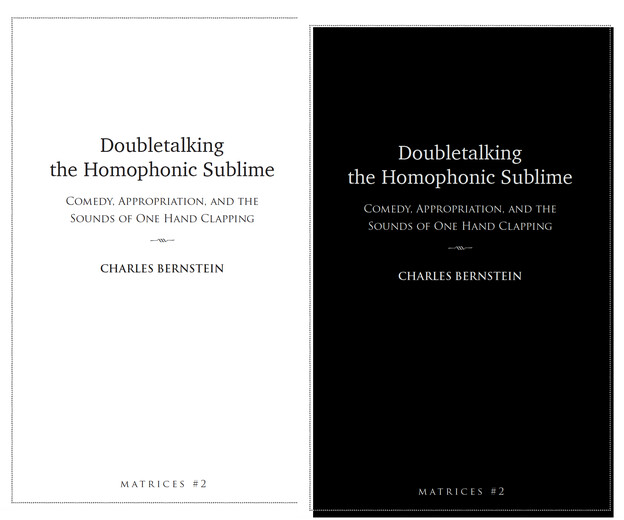
'Doubletalking the Homophonic Sublime: Comedy, Appropriation, and the Sounds of One Hand Clapping'

New from Station Hill Press: Doubletalking the Homophonic Sublime: Comedy, Appropriation, and the Sounds of One Hand Clapping. 80pp.
You can order the book from SPD or Bridge Street Books at Bookshop.org (and also from other online book sellers)
Homophonic translations create poems that foreground the sound of the original more than the lexical meaning: sound-alike poems or “sound writing.” This essay presents a dizzying number of examples of sound mimesis as a way to explore the poetics of sound and the politics of translation. Covering modernists (such as Pound, Bunting, and Khelbnikov) and contemporaries (such as David Melnick and Caroline Bergvall), Bernstein also addresses homophonics in popular culture including an extended discussion of TV comedian Sid Caear’s “double talking.” The essay raises a thorny question: are homophonic poems a form of cultural appropriation or a form of transnationalism?
"You are truly difficult, not in the sense of dictionary but in the sense that you never allow your reader to stand under rather put them on a moving stage. The desire to know is a hole in our heart, which is filled by knowing. But you continue drilling to create another new hole just beside the filled one! The only difference with a geological survey site is that the sound of your drilling is musical, not to harm but to hurt our heart with spark of lightening to rain our pain. ..." ––Runa Bandyopadhyay.
First presented on November 17, 2016, at École Normale Supérieure, Paris, as the keynote for “Sound / Writing: On Homophonic Translation,” an international trilingual colloquium, organized by Vincent Broqua and Dirk Weissmann. Translated by the author from Esperanto, “Duoble-Parolas la Homofonia Sublima: Komedio, Alproprigo, kaj la Sonoj de Unu Mano Kunfrapante.”
An audiovisual supplement (ppt / 375mb), including easy links to some of the works discussed, can be downloaded here.